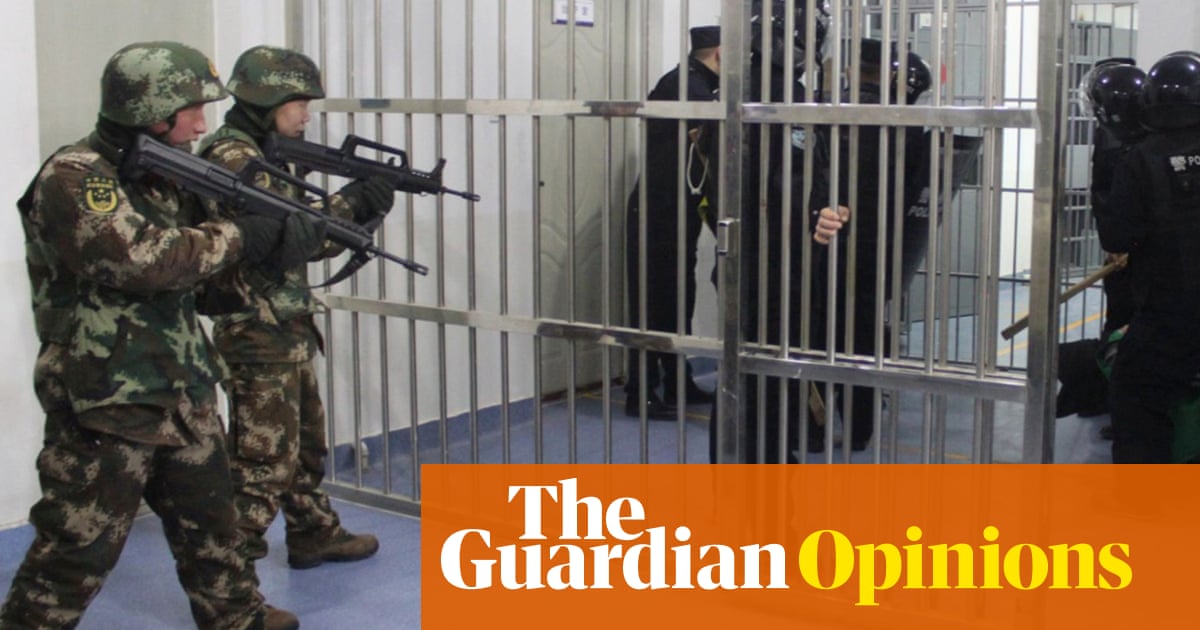
Show caption A leaked photo of Uyghurs detained in Xinjiang, China. Photograph: BBC Opinion The Guardian view on the UN in Xinjiang: a grave error Editorial The UN human rights chief, Michelle Bachelet, failed to adequately address terrible abuses in the region Tue 31 May 2022 18.25 BST Share on Facebook
Share on Twitter
Share via Email
“Not only vindicated, but justified,” a Chinese diplomat crowed on Twitter. His remark came only days after an international media consortium revealed new details of the terrible abuses taking place in Xinjiang. Internal Chinese documents – reportedly obtained by a hacker and passed on to the BBC and others – put a human face on some of the perhaps 1 million mostly Uyghur Muslim detainees who have been held in re-education camps without charge or trial, with police photographs of inmates as young as 15.
The Xinjiang police files also revealed the existence of a shoot-to-kill policy for anyone attempting to flee these centres, and people being jailed for up to 10 years because their phone has run out of credit – apparently regarded as an attempt to avoid digital surveillance. In one county, around one in eight adults were detained in 2017-18. Previously documented abuses include forced sterilisations, children being sent to state boarding schools because their parents are detained, and people being held because they have relatives overseas.
Yet Beijing has cause to celebrate, and it comes from an unlikely source. The diplomat was celebrating the visit of the UN human rights chief and former Chilean president Michelle Bachelet, herself a survivor of torture, who has forthrightly condemned abuses elsewhere. Ms Bachelet is the first high commissioner for human rights to visit China since 2005, and was able to travel to Xinjiang during her six-day visit at the end of May. But independent investigators have not been permitted access to the region, and diplomats have turned down visits rather than take Potemkin tours. China said that Covid controls required a “closed loop” for the trip. Shortly after arrival, her office had to rebut state media’s claim that she had praised China’s record on rights in an online meeting with Xi Jinping.
By its end, her trip looked like a coup, not for the UN human rights chief but for Chinese propaganda authorities. Agnès Callamard, now secretary general of Amnesty International but previously a UN special rapporteur, wrote on Twitter that she was “speechless” at Ms Bachelet’s concluding remarks, and described the sections on the Uyghurs and Tibet as “surreal”.
Ms Bachelet stressed that her trip was not an investigation, raised concerns about rights violations in Xinjiang, and said the arrests of journalists, lawyers and others in Hong Kong were “deeply worrying”. But she spent much of her press conference giving lengthy answers to questions from Chinese state media about human rights violations in the US – issues that deserve attention, and get them elsewhere. She praised NGOs for improving LGBTQ+ rights, without mentioning that such work and such rights are under the most intense pressure for years.
Most strikingly, she adopted Beijing’s language in speaking of Xinjiang. She said that “the government assured me that the vocational education and training centre system has been dismantled”, using Beijing’s names for the detention camps – but did not address the evidence that many inmates have been sentenced to forced labour or long prison terms instead. Mass detention, and intensive surveillance outside the camps, continues.
Ms Bachelet’s handling of this visit has seriously diminished the credibility of her office. The best she can do now is to release the long awaited, and reportedly much more critical, report into Xinjiang that her team completed months ago. There is no reason, and no excuse, to delay any longer.







